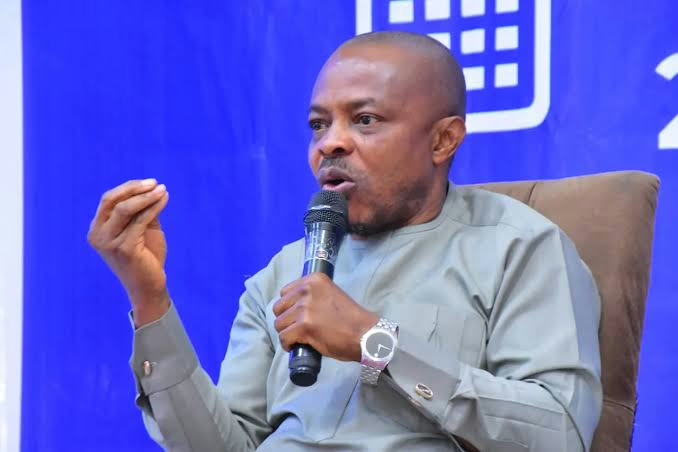The Federal Government is set to commence the trial of about 2,000 Boko Haram members arrested for participating in terror activities and has lined up eight judges to handle the special trial.
The trial will take place in Kainji, Niger State, under a secure environment provided by a special security outfit, Operation Safe Corridor, with many of the suspects already in detention at the facility.
Top security and ministry sources confided in Saturday PUNCH that the arrangement for the trial of the suspects had been concluded by the Ministry of Justice in the administration of former President Muhammadu Buhari, but some logistic issues frustrated the move.
It was learnt that the ministry wrote to the Nigerian Air Force to airlift the judges and lawyers, who will serve as prosecutors and defence counsel for the suspects, but did not get a positive response, hence the delay in the commencement of the trial.
A top official of the ministry confided in one of our correspondents, “We have taken steps to try the suspects; you know some people that are due to be transferred to the Operation Safe Corridor. We have written to the air force to assist us with logistics to convey some of the suspects, who are to undergo rehabilitation, from Kainji to the Operation Safe Corridor in Gombe State to free up the detention facility and then we’ve also written to them to make arrangements for the transportation of judges and lawyers in kind.
“We are awaiting the CJ to give us a date (for the commencement of trial). We have written to him (CJ) to inform him to give us a date, something at the convenience of the court; so, we are waiting for a correspondence from him to tell us when it is convenient.”
When asked how many suspects would be transferred to the Operation Safe Corridor, the source said about 1,000.
The source added that about 2,000 persons would face trial for their roles in the Boko Haram’s deadly onslaught against fellow citizens and security agents in many parts of the North, especially in the North-East with the group taking over some territories, hoisting it flag and forcefully collecting tributes from farmers before they can go to their farms.
When asked if there was a timeline for the prosecution of the suspects, the source said, “No, we do not have a timeline. You know the judges that will be trying these cases are also going to be handling their regular cases; so, what we do normally is that we stagger the trial. We go there for two weeks; everyone will come back to their offices, do a few things and then go back.
“The trial will be fast tracked, but I wouldn’t say we have any timeline. Once we start, we will be able to say that we will be able to dispose of all the cases within a certain period of time. At this point I cannot say.”
The source added that more suspects might face trial because “the insurgency is ongoing so as they arrest (more suspects) at the frontline, we will profile them and take them (for trial) unless the insurgency stops.”
On the judges, the source stated, “I think the CJ has designated eight judges to handle the trial, but I don’t know if all the eight will sit at the same time.
“There can’t be dedicated judges solely for the trial of the Boko Haram suspects unless we employ new judges, because the ones on ground already have ongoing cases they are trying. If they are criminal cases, once you take it from them and say go and face terrorism cases, it means all those cases will start afresh; so you are going to be taken from here and given to that place and deprive the other place.
“It means the regular cases will suffer but I think it is okay, because the arrangement is okay; it is even the prosecutors that will feel it more; if we move the 20 lawyers to Kainji essentially, the department will suffer and will be empty. If you go there and spend two or three weeks and come back, we will be able to attend to work here and do whatever we are doing and go back, after all, the regular courts take adjournments.”
More than 205 persons have been convicted on charges related to their involvement with the militant Islamist group, which began an insurgency in 2009 aimed at creating an Islamic state in the North-East.
The jail terms ranged from three to 60 years, while over 1,500 persons allegedly affiliated with Boko Haram have been released for rehabilitation over the years.
More than 35,000 persons have been killed and two million forced to flee their homes since the insurgency began.
The Solicitor-General of the Federation and Permanent Secretary of the Federal Ministry of Justice, Mrs Beatrice Jedy-Agba, had told journalists in January that the Federal Government would commence the second phase of the prosecution of Boko Haram suspects being held in Kainji, Niger State.
She stated, “The Federal Government is taking steps to reconfigure the military holding facilities to make it adaptable and conducive for the recommencement of trial. We will start the prosecution by the end of the first quarter of 2023. We are in the process of renovating and, in fact, reconstructing facilities such as the courtrooms and residential areas.
“It is important to ensure that there are enhanced measures put in place. We are utilising military facilities and therefore, they were not built like proper courts.
“The resort to the use of military facilities is to ensure that trials are conducted in a safe and secure environment. There are risks associated with moving such a large number of accused persons at the same time for trial, so this is one critical issue that is of utmost concern.”
Tinubu may stop amnesty for repentant Boko Haram
Meanwhile, President Bola Tinubu may discontinue the De-radicalisation, Rehabilitation and Reintegration Programme for repentant Boko Haram insurgents over the huge financial costs of the programme, Saturday PUNCH has learnt.
The Federal Government, it was learnt, might wind down the amnesty programme, which has gulped several billions of naira and focuses mainly on strengthening military operations in the North-East to end the insurgency as quickly as possible.
This is as the military authorities are planning to transfer another 1,000 insurgents from a detention facility in Kainji, Niger State, to a rehabilitation centre in Gombe State.
The immediate past Chief of Defence Staff, General Godwin Irabor, disclosed in January that over 83,000 insurgents had surrendered to the Nigerian Army through the Operation Safe Corridor programme.
Irabor made the disclosure during the fifth stakeholders’ meeting of the Operation Safe Corridor in Abuja.
Represented by the Chief of Defence Training and Operation, Maj.-Gen Adeyemi Yekini, the ex-CDS said 613 persons were undergoing de-radicalisation and rehabilitation as being handled by the OPSC.
In March 2022, a total of 500 ex-Boko Haram terrorists were reportedly released from the De-radicalisation, Rehabilitation and Reintegration Camp in Mallam Sidi, Kwami Local Government Area of Gombe State, after undergoing reformation at the facility.
They were also reportedly given N20,000 grant each after their release into society, but there have been reports of many of them getting involved in criminal activities or going back to the Islamist sect.
The OPSC was established by Buhari in September 2015 as a window for willing and repentant terrorists to lay down their arms and undergo a structured de-radicalisation, rehabilitation and reintegration programme.
The OPSC receives voluntary defectors from factions of the Boko Haram terrorist group as part of a long-term and non-kinetic strategy to degrade militant activities in the North-East.
The creation of the programme followed the realisation that the Nigerian military would not be able to quell the Boko Haram insurgency, which it has been battling since 2009, by force alone.
However, the programme has encountered several challenges, including the influx of many civilians fleeing Boko Haram areas being mislabelled as terrorists, thereby congesting the system and deterring donors.
Many Nigerians are also opposed to the rehabilitation of the insurgents, saying they instead deserved to face justice for the atrocities they committed.
But a top official confided in Saturday PUNCH on Friday that Tinubu “is not likely to continue with the amnesty for insurgents,” citing the huge financial burden and the fact that several rehabilitated insurgents had returned to combat.
In the 2023 budget, the Federal Government allocated N2.4bn for the establishment of two rehabilitation centres for repent members of Boko Haram and other terrorist groups.
According to a presentation made by the Coordinator of the National Counter Terrorism Centre, Rear Admiral Yem Musa (retd.), to the House of Representatives Committee on National Security and Intelligence last December, this is part of the capital projects of the NCTC for 2023.
Out of a capital expenditure of N3.839bn, a total of N2.4bn will be spent on the centres.
But responding to questions on the future of the programme, a reliable Presidency source said, “The President may not want to toe that line. There’s so much that has gone into rehabilitating repentant terrorists already. And it’s quite expensive to maintain. He may not continue with it.”
The media aide to the President, Dele Alake, could not be reached for comments on the matter as he did not respond to inquiries.
A security expert, Chidi Omeje, urged the President to reform the amnesty programme rather than abolish it.
He added that kinetic means alone could not win the war, adding that amnesty was one of the non-kinetic means of taming insurgency.
Omeje said, “I think the President needs to tarry because of the advantages of giving amnesty, which include encouraging others to surrender and it has discouraged the lumping of insurgents with some people who were conscripted into terrorism.
“I am sure he has good intentions because there are also some people who have found their way back after being released into society. But we should look at the larger picture and how we can encourage more people to surrender. Rather than stop it, I think reform will help bring about the best in the programme.”
But a security consultant, Oladele Fajana, disagreed with suggestions that the programme should continue, saying, “We should stop encouraging criminality in the country. I don’t subscribe to offering money or other things for criminals to lay down their arms.
“What about those who have shunned crime and had their loved ones killed by terrorists? Besides, how long do you want to continue to give them free money? Many of those surrendering were forced to join the sect, but we should not make them live better than the victims, some of whom are still struggling with life.”
Speaking on the planned prosecution of 2,000 arrested insurgents, a senior lawyer, Emeka Etiaba, SAN, said the number of judges was inadequate, adding that the ongoing cases “in the dockets of the assigned judges will suffer.”
However, he noted that if the suspects were tried in groups, the workload of the judges would be reduced.
“It (number of judges) can’t be adequate. The important thing is that something would have started. Out of the 2,000 Boko Haram suspects, many of them may be tried in groups, so if you have 100 charged together, that becomes one case,” Etiaba stated.
Another senior lawyer, Ifedayo Adedipe, said the use of technology could quicken the prosecution of terror cases, noting that criminal cases were relatively easier to prove in some circumstances.
He added, “For the Boko Haram suspects they have arrested in the cause of committing this atrocity, the onus will shift on them to explain where they got arms from and why they are doing what they are doing.
“These days, it is no longer by long hands; if you deploy technology, in record time, they will finish the cases. We wish the Federal Government the best of luck.”
A security expert, Olalekan Ojo, said eight judges were enough to prosecute the insurgents, noting that since the crimes were monolithic, judgments could be passed concurrently.
“All of them committed the same offence; taking arms against the country. In this case, 50 of them can be taken to court at the same time. So, in only one to three weeks, each of them (judges) can send 50 people to jail,” he argued.
Ojo, however, expressed doubts about the planned trial, noting that the insurgents still had political and religious sympathisers.
“Are we really sure that they are going to prosecute these people? I am in doubt because these are the same people who were granted amnesty somehow. Those people that have political and religious sympathies; are they all dead? They are not dead,” he declared.
On his part, Patrick Agbambu, a security analyst, stated, “What is unclear about the plan is if the eight judges will form the jury or each judge will preside over a court session. A little more information needs to be provided about that. But by and large, it’s a welcome development and Nigerians are looking forward to the speedy trial of the suspects.”
Credit: PUNCH











Leave a Reply